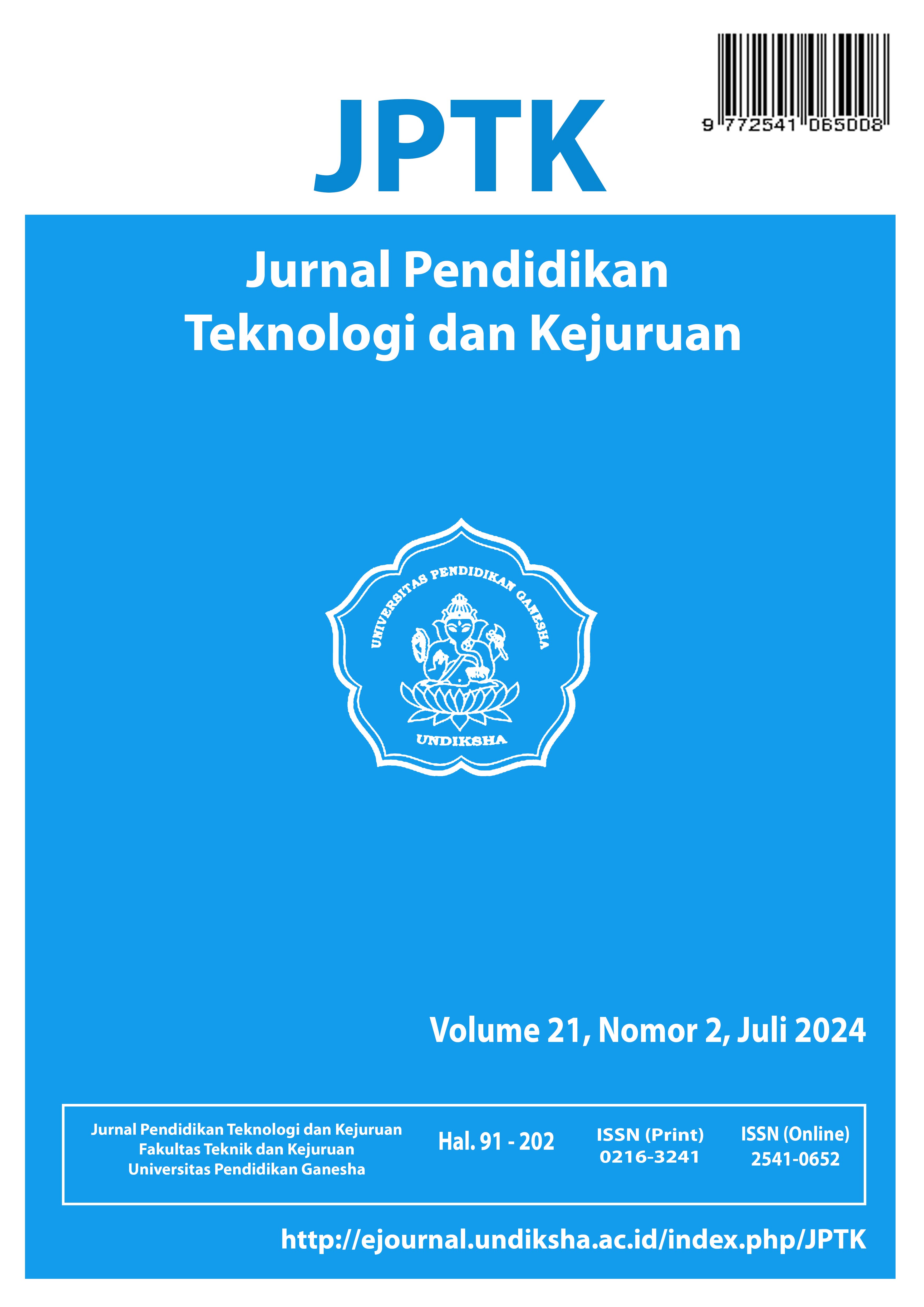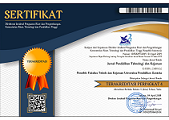TRANSFORMASI PELAYANAN DIGITAL DALAM PARIWISATA BALI: STUDI KASUS APLIKASI DENPASAR PRAMA SEWAKA
DOI:
https://doi.org/10.23887/jptkundiksha.v21i2.83486Keywords:
pariwisata, transformasi digital, pelayanan digital, kepuasan pelanggan, BaliAbstract
Penelitian ini bertujuan untuk mengisi dan memperluas kekurangan penelitian yang ada tentang bagaimana teknologi dapat meningkatkan kepuasan pelanggan dan memberikan keunggulan kompetitif bagi Bali sebagai destinasi pariwisata dengan transformasi digital. Salah satu inovasi teknologi yang menjadi fokus penelitian adalah layanan pariwisata digital. Pelayanan pariwisata digital sangat penting untuk memperluas hubungan, interaksi, dan kepuasan pelanggan. Penelitian ini dilakukan dengan teknik purposive sampling sebagai metode kualitatif. Informan utama penelitian ini adalah pengembangan aplikasi yang digunakan untuk menerapkan transformasi pelayanan digital. aplikasi ini digunakan oleh Dinas Komunikasi, Informatika, dan Statistik Denpasar, serta pemerintah daerah terkait. Data dikumpulkan melalui observasi partisipatif dan wawancara menyeluruh. Hasil penelitian menunjukkan bahwa Implementasi transformasi digital dalam layanan pariwisata Bali secara signifikan meningkatkan efisiensi dan efektivitas layanan karena penggunaan teknologi digital dan inovasi terkait. Aplikasi pelayanan digital, seperti Denpasar Prama Sewaka, memungkinkan masyarakat mengakses informasi pariwisata dan mengajukan pengaduan secara online, yang mempercepat penyelesaian masalah dan meningkatkan kepuasan Masyarakat. Namun, transformasi digital juga menghadapi hambatan, terutama kurangnya literasi atau edukasi masyarakat tentang penggunaan teknologi digital. Oleh karena itu, diperlukan upaya intensif untuk meningkatkan literasi digital di masyarakat Bali. Untuk mengatasi hambatan tersebut, evaluasi dan pembaharuan yang tepat waktu juga penting. Sektor pariwisata Bali dapat tetap relevan dan meningkatkan layanan kepada wisatawan dengan melakukan evaluasi dan pembaharuan yang sesuai dengan perkembangan teknologi dan kebutuhan pasar. Ini akan memenuhi Sustainable Development Goals (SDGs) dalam mencapai pariwisata berkelanjutan.
References
F. Frenzel, J. Giddy, and T. Frisch, “Digital technology, tourism and geographies of inequality,” Tour. Geogr., vol. 24, no. 6–7, pp. 923–933, 2022, doi: 10.1080/14616688.2022.2142843.
N. S. Subawa, N. W. Widhiasthini, N. P. I. Permatasari, and N. N. Sri Wisudawati, “MSMEs envisaged as the economy spearhead for Bali in the covid-19 pandemic situation,” Cogent Econ. Financ., vol. 10, no. 1, 2022, doi: 10.1080/23322039.2022.2096200.
P. Pahrudin, T. H. Hsieh, L. W. Liu, and C. C. Wang, “The Role of Information Sources on Tourist Behavior Post-Earthquake Disaster in Indonesia: A Stimulus–Organism–Response (SOR) Approach,” Sustain., vol. 15, no. 11, 2023, doi: 10.3390/su15118446.
J. Kleinert, “Digital transformation,” Empirica, 2021, doi: 10.1007/s10663-021-09501-0.
N. V Morze and O. V Strutynska, “Digital transformation in society: key aspects for model development,” J. Phys. Conf. Ser., 2021, doi: 10.1088/1742-6596/1946/1/012021.
L. W. Liu, C. C. Wang, P. Pahrudin, A. F. Royanow, C. Lu, and I. Rahadi, “Does virtual tourism influence tourist visit intention on actual attraction? A study from tourist behavior in Indonesia,” Cogent Soc. Sci., vol. 9, no. 1, 2023, doi: 10.1080/23311886.2023.2240052.
C.-H. L. Shu-Ning Zhang Yong-Quan Li and W.-Q. Ruan, “Critical factors in the identification of word-of-mouth enhanced with travel apps: the moderating roles of Confucian culture and the switching cost view,” Asia Pacific J. Tour. Res., vol. 24, no. 5, pp. 422–442, 2019, doi: 10.1080/10941665.2019.1572630.
M. Manchanda and M. Deb, “Effects of multisensory virtual reality on virtual and physical tourism during the COVID-19 pandemic,” Curr. Issues Tour., vol. 25, no. 11, pp. 1748–1766, 2022, doi: 10.1080/13683500.2021.1978953.
K. Berbeka, W. Alejziak, and J. Berbeka, “Sustainable development goals of Agenda 2030 in the declarations and aims of international tourism organisations,” J. Travel Tour. Mark., vol. 41, no. 1, pp. 142–153, 2024, doi: 10.1080/10548408.2023.2239862.
M. Santos and C. Bastos, “The adoption of sustainable development goals by large Portuguese companies,” Soc. Responsib. J., vol. ahead-of-p, 2020, doi: 10.1108/SRJ-07-2018-0184.
P. Milwood, “Social responsibility and the SDGs: vignettes of Caribbean tour operators,” Worldw. Hosp. Tour. Themes, vol. ahead-of-p, 2020, doi: 10.1108/WHATT-02-2020-0005.
D. Buhalis et al., “Editorial: Tourism 2030 and the contribution to the sustainable development goals: the tourism review viewpoint,” Tour. Rev., vol. 78, pp. 293–313, 2023, doi: 10.1108/TR-04-2023-620.
N. Carroll, B. Mc Lafferty, K. Conboy, and B. Donnellan, “Normalising a Digital Transformation,” Int. Conf. Inf. Syst., no. 12, 2021.
N. Chemma, M. El Amine Abdelli, A. Awasthi, and E. Mogaji, “Management and Information Technology in the Digital Era: Introduction to Edited Collection on Challenges and Perspectives,” in Management and Information Technology in the Digital Era, vol. 29, N. Chemma, M. El Amine Abdelli, A. Awasthi, and E. Mogaji, Eds., in Advanced Series in Management, vol. 29. , Emerald Publishing Limited, 2022, pp. 1–6. doi: 10.1108/S1877-636120220000029001.
and G. P. J. Loonam, S. Eaves, V. Kumar, “Towards digital transformation: Lessons learned from traditional organizations,” Strateg. Chang, vol. 27, no. 101–109, 2018, p. 2, 2018.
and R. G. B. Hinings, T. Gegenhuber, “Digital innovation and transformation: An institutional perspective,”,” Inf. Organ., vol. 28, no. pp. 52–61, p. 1, 2018.
K. Hadiono and R. C. Noor Santi, “Menyongsong Transformasi Digital,” Proceeding Sendiu, no. July, pp. 978–979, 2020.
N. Carroll and M. Maher, “How Shell Fueled Digital Transformation by Establishing DIY Software Development,” Mis Q. Exec., vol. 22, no. 2, pp. 99–127, 2023, doi: 10.17705/2msqe.00076.
T. Hess and M. Bohrer, “Digital Transformation of Software Companies - brilliant Idea or unnecessary Action ?,” vol. 7477, pp. 0–3, 2022.
N. Carroll, “Theorizing on the Normalization of Digital Transformations Association for Information Systems TRANSFORMATIONS,” no. June 2020, 2023.
S. Kraus, P. Jones, N. Kailer, A. Weinmann, and ..., “Digital transformation: An overview of the current state of the art of research,” Sage …, 2021, doi: 10.1177/21582440211047576.
S. Kuhlmann and M. Heuberger, “Digital transformation going local: implementation, impacts and constraints from a German perspective,” Public Money Manag., vol. 43, no. 2, pp. 147–155, 2023, doi: 10.1080/09540962.2021.1939584.
L. Mora et al., “Assembling Sustainable Smart City Transitions: An Interdisciplinary Theoretical Perspective,” J. Urban Technol., vol. 28, no. 1–2, pp. 1–27, 2021, doi: 10.1080/10630732.2020.1834831.
N. Crutzen, J. Van Bockhaven, S. Schaltegger, and R. Giffinger, “Guest editorial,” Sustain. Accounting, Manag. Policy J., vol. 10, no. 4, pp. 646–653, 2019, doi: 10.1108/SAMPJ-12-2018-0354.
R. Macrorie, S. Marvin, A. Smith, and A. While, “A Common Management Framework for European Smart Cities? The Case of the European Innovation Partnership for Smart Cities and Communities Six Nations Forum,” J. Urban Technol., vol. 30, no. 3, pp. 63–80, 2023, doi: 10.1080/10630732.2022.2121558.
J. Colding, M. Colding, and S. Barthel, “The smart city model: A new panacea for urban sustainability or unmanageable complexity?,” Environ. Plan. B Urban Anal. City Sci., vol. 47, no. 1, pp. 179–187, 2020, doi: 10.1177/2399808318763164.
M. Cichosz, C. M. Wallenburg, and A. M. Knemeyer, “Digital transformation at logistics service providers: barriers, success factors and leading practices,” Int. J. Logist. Manag., vol. 31, no. 2, pp. 209–238, 2020, doi: 10.1108/IJLM-08-2019-0229.
S. F. Jahanmir, G. M. Silva, P. J. Gomes, and H. M. Gonçalves, “Determinants of users’ continuance intention toward digital innovations: Are late adopters different?,” J. Bus. Res., vol. 115, pp. 225–233, 2020, doi: https://doi.org/10.1016/j.jbusres.2019.11.010.
S. Kraus, P. Jones, N. Kailer, A. Weinmann, N. Chaparro-Banegas, and N. Roig-Tierno, “Digital Transformation: An Overview of the Current State of the Art of Research,” SAGE Open, vol. 11, no. 3, 2021, doi: 10.1177/21582440211047576.
F. Li, “The digital transformation of business models in the creative industries: A holistic framework and emerging trends,” Technovation, vol. 92–93 (202, 2020, doi: 10.1016/j.technovation.2017.12.004.
P. C. Verhoef et al., “Digital transformation: A multidisciplinary reflection and research agenda,” J. Bus. Res., vol. 122, no. November 2019, pp. 889–901, 2021, doi: 10.1016/j.jbusres.2019.09.022.
C. M. T. Lai and A. Cole, “Measuring progress of smart cities: Indexing the smart city indices,” Urban Gov., vol. 3, no. 1, pp. 45–57, 2023, doi: 10.1016/j.ugj.2022.11.004.
H. Samih, “Smart cities and internet of things,” J. Inf. Technol. Case Appl. Res., vol. 21, no. 1, pp. 3–12, 2019, doi: 10.1080/15228053.2019.1587572.
R. Hu, “The State of Smart Cities in China: The Case of Shenzhen,” Energies, vol. 12, p. 4375, 2019, doi: 10.3390/en12224375.
M. Treude, R. Schüle, and H. Haake, “Smart Sustainable Cities—Case Study Südwestfalen Germany,” Sustain., vol. 14, no. 10, pp. 1–16, 2022, doi: 10.3390/su14105957.
A. C. van den Berg, S. N. Giest, S. M. Groeneveld, and W. Kraaij, “Inclusivity in Online Platforms: Recruitment Strategies for Improving Participation of Diverse Sociodemographic Groups,” Public Adm. Rev., vol. 80, no. 6, pp. 989–1000, 2020, doi: 10.1111/puar.13215.
C. K. Xu and T. Tang, “Closing the Gap or Widening the Divide: The Impacts of Technology-Enabled Coproduction on Equity in Public Service Delivery,” Public Adm. Rev., vol. 80, no. 6, pp. 962–975, 2020, doi: 10.1111/puar.13222.
K. Glyptou, “Operationalising Tourism Sustainability at the Destination Level: A Systems Thinking Approach Along the SDGs,” Tour. Plan. Dev., vol. 21, no. 1, pp. 95–121, 2024, doi: 10.1080/21568316.2022.2069150.
K. A. Boluk, C. T. Cavaliere, and F. Higgins-Desbiolles, “A critical framework for interrogating the United Nations Sustainable Development Goals 2030 Agenda in tourism,” J. Sustain. Tour., vol. 27, no. 7, pp. 847–864, 2019, doi: 10.1080/09669582.2019.1619748.
J. Brune, “Sustainable development through the tourism sector: to what extent can sustainable tourism contribute to social justice for the local communities? A case study of the Grootbos Private Nature Reserve in South Africa,” Res. Hosp. Manag., vol. 12, no. 2, pp. 133–141, 2022, doi: 10.1080/22243534.2022.2133070.
Downloads
Published
Issue
Section
License
Authors who publish with the JPTK agree to the following terms:- Authors retain copyright and grant the journal the right of first publication with the work simultaneously licensed under a Creative Commons Attribution License (CC BY-SA 4.0) that allows others to share the work with an acknowledgment of the work's authorship and initial publication in this journal
- Authors are able to enter into separate, additional contractual arrangements for the non-exclusive distribution of the journal's published version of the work (e.g., post it to an institutional repository or publish it in a book), with an acknowledgment of its initial publication in this journal.
- Authors are permitted and encouraged to post their work online (e.g., in institutional repositories or on their website) prior to and during the submission process, as it can lead to productive exchanges, as well as earlier and greater citation of published work. (See The Effect of Open Access)












